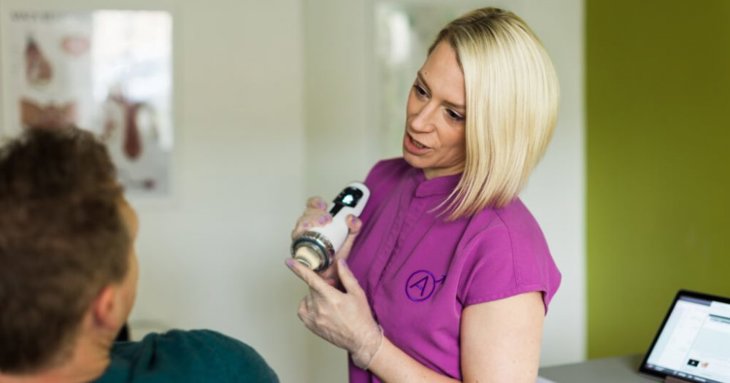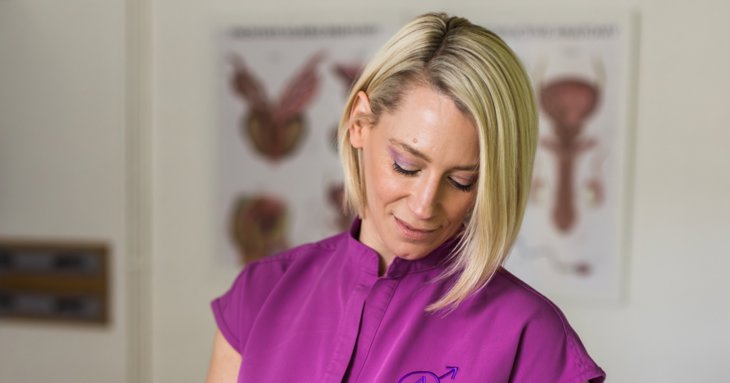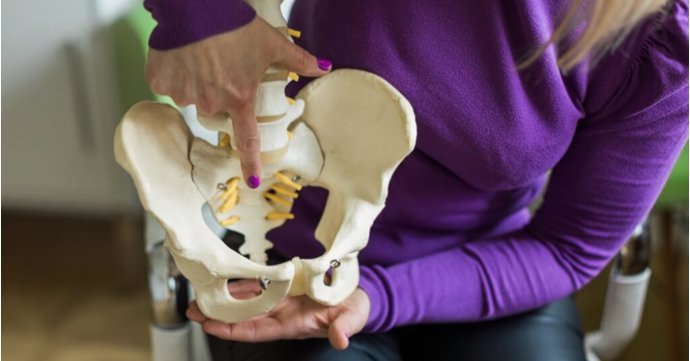Peyronie's disease, a condition which causes the penis to curve when erect, can have a damaging effect on men's sexual health, confidence and relationships, often causing difficulty and discomfort in the bedroom.
Fortunately, Cheltenham's only men's health clinic, Aubergine Physio, provides comprehensive care and support for people with this condition, with a focus on using Focused Shockwave Therapy to address the symptoms and target the cause.
Director Stephanie Smith-Rowles explains how this innovative treatment offers a fast, painless and risk-free alternative to medication and surgery that's worth considering.
What is Peyronie's disease?
Peyronie's disease is a condition in which fibrous scar tissue — known as plaque — develops within the tissues beneath the skin of the penis.
This plaque prevents the penile tissue from expanding equally on the sides affected; there can be multiple plaques in different locations which can sometimes form an hourglass effect and result in a loss of erection at the end of the penis.
A plaque causes curved erections of varying degrees. Initially, in the acute phase of the condition, erections, the pelvic floor and inguinal area can be quite painful.
Many men with Peyronie's can engage in sexual intercourse, but for others it can be incredibly difficult, painful or even impossible — and they may also experience a degree of erectile dysfunction.
It's a common men's health condition, affecting approximately four in 100 men between the ages of 40 and 70. It's more common in men over 30 but can affect younger men, too.
Peyronie's occurs in two distinct stages: the acute phase, where patients will notice pain, then plaques starting to form. These are firm nodules that may feel like a string of rosary beads. Within this phase, patients will notice significant changes to the curvature of their penis, which may worsen over a duration of time — usually 12 to 18 months.
This is followed by the chronic phase, where there are no further changes to the penis and the pain subsides, but the curvature persists.
It's important to note that Peyronie's disease is not contagious and cannot be transmitted to others.
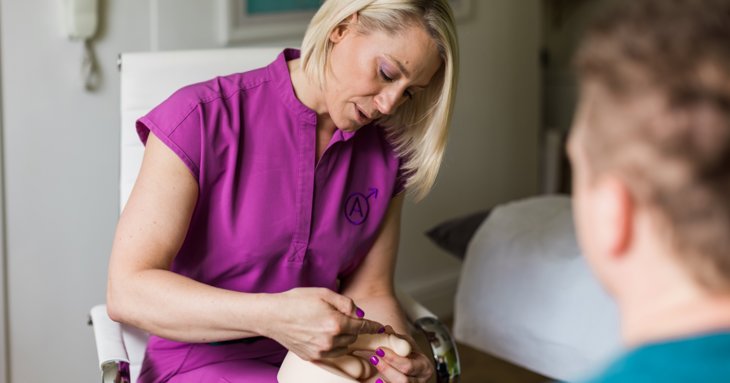
What causes Peyronie's disease?
It's not fully understood what causes Peyronie's disease, but researchers have put forward some theories.
Genetic factors could influence the formation of fibrous plaques; another possibility is trauma to the penis, which could be injured by vigorous sexual intercourse or contact sports.
When injury occurs to the tunica albuginea, a resilient layer of connective tissue enveloping the penis, it can result in the formation of scar tissue — which manifests as the characteristic plaque in Peyronie's disease.
It's also plausible that a combination of genetic factors and trauma contributes to the condition in certain people.
Peyronie's disease can also be likened to Dupuytren’s contracture of the hand and Ledderhose disease of the feet — and more often affects patients who have these conditions.
Research into Peyronie's disease is ongoing so although the causes of this condition remain somewhat elusive, we're getting closer to a comprehensive understanding of its origins.
How can you treat the symptoms of Peyronie's disease at Aubergine Physio?
People
seeking relief from Peyronie's disease may have sought advice from their GP or consultant urologist for a diagnosis and to rule out alternative pathologies.
Patients come across all kinds of treatments, from pills, creams and injections
to medical vacuum 'Soma Correct’ pump physiotherapy and penile traction
therapy.
These options can certainly help with symptoms, but they don't address the underlying cause of the condition.
Surgery is another alternative, typically recommended for severe cases when non-surgical treatments have proven ineffective and the curvature persists for longer than 12 months; but of course, it comes with risks that can have life-altering consequences.
Surgical procedures involve the removal of fibrous scar tissue or creating new scar tissue on the opposite side of the penis to even out the curvature, but this can shorten the length of the penis. Not to mention surgery requires anesthesia, an overnight stay in hospital and a recovery period that ranges from three days to six weeks.
However, at Aubergine Physio, we offer an alternative, so patients don't have to live with simply managing their Peyronie's or face surgery.
Focus Shockwave Therapy is a clinically proven treatment that's specifically designed for Peyronie's disease and National Institute for Health and Care Excellence (NICE) approved. With a 50 per cent success rate, this can be a life-changing treatment for most patients.
Unlike other treatment options, Focused Shockwave Therapy targets the root of the problem without any known side effects or risks.
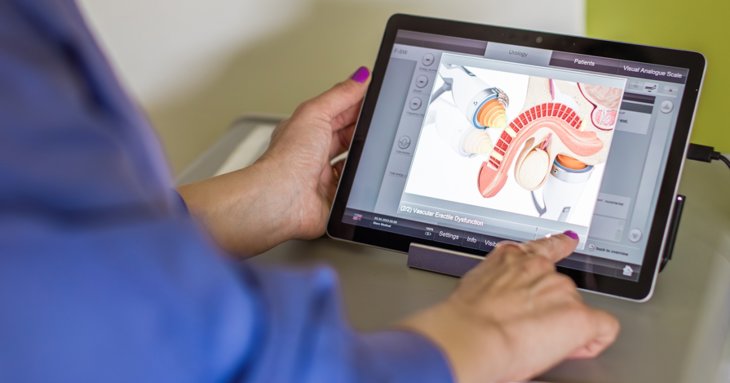
How does Focused Shockwave Therapy treat Peyronie's disease?
Focused Shockwave Therapy is a non-invasive procedure, which delivers high-pressure, low frequency sound waves to targeted areas of the body.
When treating Peyronie's disease, our physiotherapists administer the treatment directly to the fibrous plaques responsible for the curvature; this stimulates the body's natural healing mechanisms, encouraging the plaques to break down and be reabsorbed. It also promotes natural healing of collagen in the affected area and improves blood flow, which also treats the accompanying erectile dysfunction.
By targeting the plaque within the penis and reducing its size, Focused Shockwave Therapy can help to restore the penis's normal curvature and boost the patient's overall sexual function — enhancing the aesthetic appearance, length and functionality of the penis.
It's a very quick, pain-free and discreet process, so patients can get on with their day immediately after each session.
What can patients expect when getting treated for Peyronie's disease at Aubergine Physio?
It all starts with a 15-minute discovery call, where we learn about our patients, their condition and how it impacts their lifestyle.
Our team of physiotherapists work closely with every patient to develop a personalised treatment plan, tailored to their specific needs and goals.
Comfort and wellbeing is the number one priority for us and we ensure our patients are actively involved in the decision-making process every step of the way. We understand that Peyronie's disease can have an enormous impact on men's confidence and relationships, so it's our mission to provide our patients with the support and expertise they need to regain control over their sexual health.
When it comes to Focused Shockwave Therapy, it's important to remember that everyone responds differently and results vary from person-to-person — we can't guarantee specific outcomes, and the number of treatments depends on the severity of the condition and individual response.
To start with, we typically recommend a minimum of six sessions, but patients may need up to 12.
For
optimum results, we suggest a course of Focused Shockwave Therapy, combined with
vitamin E oil for self-massaging the plaque, additional supplements to
promote healing, and regular use of a penile 'Soma Correct' vacuum pump.
Our treatment aims to reduce pain; reduce the size and hardness of the plaques to promote a reduction in curvature; and relieve the discomfort associated with Peyronie's disease, to help men engage in sexual activity more comfortably and reclaim confidence in the bedroom.
